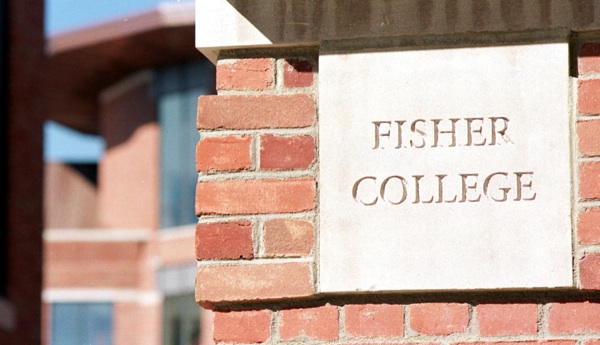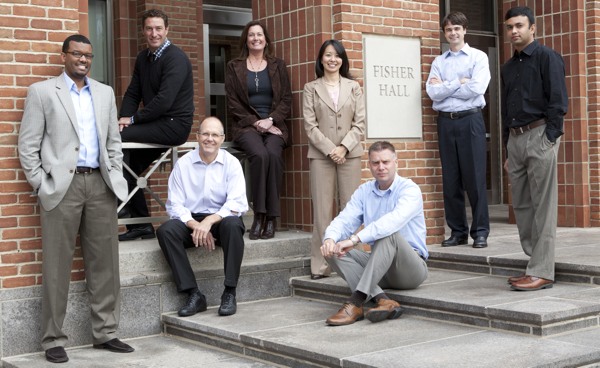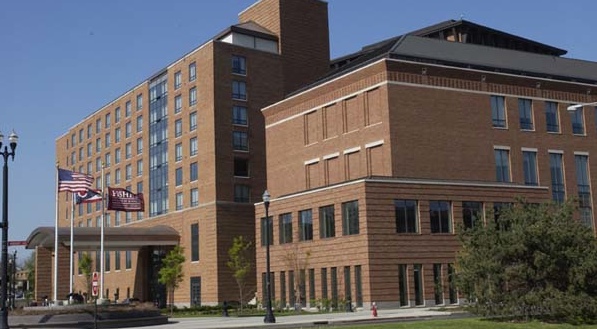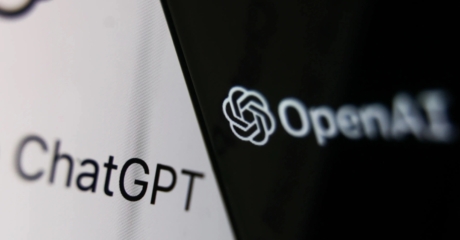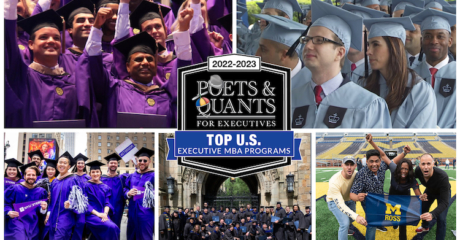The Fisher College of Business EMBA program welcomes prospective students who have goals of not only advancing their education for personal gain, but for the benefit of the greater good. Associate Director of Engagement Anna Morris says, “Our students have anything but a cutthroat ‘need to be at the top of the ladder’ mentality. The culture here complements the collectivistic Midwest style; students are advancing their education for the greater good.”
The program takes place over seventeen short months. Morris says the department assesses applicants holistically, which includes personal interviews held with the associate dean, the director, and Morris herself. “We want to understand why they are coming to the program.”
“We have students, for example, who come into the program close to retirement but still want to have a great impact on their community. Sometimes they want to start a nonprofit or serve on a board. They want to have an understanding of those broader business aspects so they can make that impact on the community. Their goal isn’t, ‘I want to become a C-suite employee,’ but rather, ‘I want to be in the C-suite to make a difference.’”
There is a strong emphasis on building relationships through in-person learning. Associate Director Anna Morris says, “When online learning first took off, it seemed as though students favored this style, but over time especially after the pandemic, most students desired in-person learning programs. We are now finding that executives really want to be in the classroom. They want to get to know each other and have lunch with their peers. They want to socialize at happy hour after class, and network. They see the value in connecting with each other in person.”
With building a resilient program in mind, the College of Business recently invested in technology to offer students the flexibility to access online materials. This is primarily to accommodate those who can’t be on campus for a residency under special circumstances. “If you have a sick child, or a business trip and can’t make it to campus, we want to give students the option to still be a part of the discussion. We don’t want this to be the norm but we understand that situations may arise.”
The Fisher College of Business will graduate its twentieth cohort in May. EMBA Students are required to have eight years of professional work experience, with ten or more years preferred.
Traditionally the EMBA students trend at around ninety percent “locals” from the Midwest (Indiana, Pennsylvania and Michigan) but this year they have received several out-of-state applications. Morris attributes this deviance to the pandemic. “People are wanting to get out of their bubble; they are wanting to travel and participate in person,” she says. Moving forward, Morris predicts the cohort will be seventy percent in-state students and thirty percent out-of-state.
Morris says the program’s credit hours are nonessential because students are required to stay on a fixed track with the courses as part of the program design. “They will see credits on their transcript but we don’t want students to get caught up in numbers. We just want them to see this as one comprehensive and consistent program.”
The EMBA offers standard business courses such as Organizational Behavior, Strategy, Accounting, and International Business. Faculty members customize electives that fit each cohort’s needs, based on their interests or current hot topics. Past electives had focuses such as Technology, Leadership, and C-Suite. “This past year, students were wondering, ‘Why is there a shortage of household goods such as toilet paper?’ Many of them hadn’t worked in the supply chain, so we brought in a course to give them that information.”
The students have opportunities to gain exposure to professionals inside and outside of their immediate cohort. The cohort attends fourteen on-campus residencies, three days each that typically run Thursday through Saturday. From January to May, the EMBA has two overlapping cohorts that often intermingle. They naturally form social groups and even arrange dinners with each other on the weekends. “They want to spend time with each other and get to know each other,” says Morris. “They see the value in expanding their social network.” Each semester, the college also hosts a speaker series, followed by a happy hour on Thursdays that most students attend.
The program includes immersion experiences, one hosted in Silicon Valley, and the other abroad. Staff often connect with companies where alumni work to provide the most fitting experience for the cohort. “If we have more people in the medical industry, we might reach out to a company working on medical technology; however if the cohort is based in business, we might reach out to more entrepreneurs. The experience is unique to each cohort, and we really focus on finding them the best experience based on their needs.”
Tuition cost includes what Morris describes as a “white glove” service because the program staff helps students through their application, orders all of their materials, and provides breakfast and lunch during their residencies. “It is designed this way to alleviate all logistical stress outside of doing the actual classwork. We provide breakfast and lunch during the residencies so students can step out of the classroom and focus on connecting with classmates instead of worrying about what they will get for lunch in between classes.”
Finances can be challenging for prospective students, but about fifty percent of students are fortunate to have full or partial financial support from their companies. The program has a large military presence as well, about thirty percent of their students, who attend using their GI bill.
The EMBA would love to see more women participate in the program. “According to EMBAC councils worldwide, only thirty percent of MBA graduates are women. We are committed to changing that statistic.”
The EMBA hosts a podcast series with past students, some of which are women who have successfully gone through the program, and Morris hopes hearing these relatable situations may inspire other women to attend the program. “It helps to hear success stories from other women who have gone before you. In one of our podcasts, we interviewed a student who was a new mother and heard her challenges of balancing taking care of a new baby while going to school. The program focused on finding solutions to accommodate her, and they set up a room for her to attend to the baby between classes,” says Morris.
“Seventeen months is hard to plan ahead for, especially if you are thinking about expanding your family, so if this is a possibility we want students to know we will fully support them and find ways to accommodate them,” says Morris.
The staff has one-on-one conversations to determine how to help students navigate personal barriers to attending the EMBA. “Those with barriers that we can address, we will, and in the rare case that we can’t, we will recommend to them other programs that might fit them better,” says Morris.
“With only forty people in the cohort we are really able to get to know students and help best serve their individual needs,” says Morris. The program goes above and beyond to assure accessibility to all of the students.
As an alternative to the EMBA, Fisher offers a unique executive-level graduate degree called the Master of Business Operational Excellence, rated in the top ten of graduate and professional programs by News & World Report. As one might expect, this program focuses on operational excellence, less broadly on business. Students will become Six Sigma certified as one of the highlights of the program. Only three years of professional experience are required, and the program is thirteen months long. The program hosts eight residences as well as an immersion experience, and they will be starting their fourteenth cohort this December.
Latest Up-to-Date Executive MBA Rankings:
2016 Poets&Quants: 35
2013 BusinessWeek: 13 (global) 8 (U.S.)
2011 U.S. News & World Report: NR
2010 The Wall Street Journal: 17
2016 Financial Times: NR
Rankings Analysis: Ohio State’s Executive MBA maintained its rank of 35th in PoetsandQuants’ 2016 analysis of the world’s best programs. The school did slightly better in the BusinessWeek survey of 2013 that ranks schools on the basis of graduate satisfaction and a reputation poll of EMBA program directors. Fisher’s EMBA program rose to a rank of 13th in 2013 on the BW list after finishing 14th in 2011 and15th in 2009.
A member of the Class of 2011 told BusinessWeek, “The professors and staff at the Fisher College of Business were extremely supportive of the students and their learning experience. The classes provided a balance between theory, cases, and discussion. I learned so much from not only the professors but my fellow classmates as well.”
Application Deadline: August 1st to take advantage of the application fee waiver (Fisher accepts applications beyond this date but increases the application fee to $150). The application deadline is October 30. After October 30, acceptance is based upon additional deposit and space availability.
Application Fee: Apply before August 1st for a $0 application fee. $150 after August 1st.
2019 Tuition & Fees: $115,000
Average years of Work Experience: 16.5
Average GPA: 3.3
GMAT Requirement: Required if cumulative GPA is below a 3.0. Academic transcript and professional skills reviewed before admission.
Acceptance Rate: 79%
Maximum Enrollment: 55
Female: 23%
Minority: 8%
Mean Age: 37
Classes Meet: Three days a month (Thursday, Friday, and Saturday) with occasional week long residencies
Length of Program: 17 months
Students From These Sectors:
• Financial Services: 15%
• Construction: 2%
• Consulting Services: 8%
• Healthcare: 15%
• Manufacturing: 35%
• Non-Profit: 8%
• Retail/wholesale: 2%
• Transportation: 5%
• Information Technology: 10%
Curriculum
Because your business challenges are never one-dimensional, the Fisher EMBA curriculum is designed to teach you, not only the fundamentals of sound business practice, but also how to think strategically and globally. Building on a rigorous foundation of courses covering all major areas of business, the program integrates the fundamentals into a succession of courses that are issue-oriented and customized around the interests of your class. Over the course of the program you will gain a comprehensive business perspective on current business management issues through team-taught, interdisciplinary courses. Learn to think broadly and strategically about your firm through a rigorous study of the fundamentals of business. Work on projects that directly relate to your current business problems. Prepare a business plan to hone entrepreneurial skills. Grow and learn from a diverse class of fellow business executives from a variety of industries.
Core Courses
Organizational Behavior
Strategy Formulation and Implementation
Managerial Economics
Data Analysis for Managers
Accounting for Decision Making
Financial Management
Marketing Management
Operations Management
Multinational Business Administration
Professional Development: Topics in Leadership
Sample Elective Courses
Mergers and Acquisitions
Private Equity and Venture Capital
Strategic Alliances
Enterprise Leadership
Leadership and Competitive Analysis
Career Management
The Fisher Executive MBA program works with CareerBeam to provide students with career services. The online resources and one on one coaching help students leverage themselves with their new degree. Whether students want to move up in their organization, change directions, or need help finding what the next step is, CareerBeam can help. The online resources include resume writing, interviewing skills, and research databases. The online resources remain available to EMBA alumni after graduating from the program.





